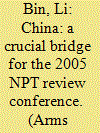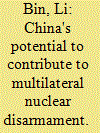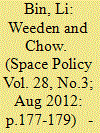| Srl | Item |
| 1 |
ID:
059721


|
|
|
|
|
| Publication |
Jan-Feb 2005.
|
|
|
|
|
|
|
|
|
|
|
|
|
|
|
|
| 2 |
ID:
107349


|
|
|
| 3 |
ID:
142388


|
|
|
|
|
| Summary/Abstract |
Chinese nuclear experts began to join international nuclear dialogues in the late 1970s when China launched its policy of reform and openness. Their communications with U.S. nuclear experts are sometimes difficult and inefficient, in part because of differences in the ways that Americans and Chinese think about nuclear weapons.
|
|
|
|
|
|
|
|
|
|
|
|
|
|
|
|
| 4 |
ID:
055835


|
|
|
| 5 |
ID:
122950


|
|
|
|
|
| Publication |
2013.
|
| Summary/Abstract |
The trade imbalance between the United States and China has expanded rapidly over the past two decades. Exactly how much US export controls contribute to this development is an important question. This article examines the various political barriers constraining US exports to China, and in particular their impact on the export of dual-use products with high military applications. The article then quantitatively measures the magnitude of this impact and the corresponding potential US export capability were certain levels of export control to be liberalized. The conclusion drawn here is that the United States has the potential to significantly increase its exports to China by liberalizing its export constraints against the PRC.
|
|
|
|
|
|
|
|
|
|
|
|
|
|
|
|
| 6 |
ID:
172894


|
|
|
|
|
| Summary/Abstract |
The U.S. government considers “power competition” to be the nature of the relations among big powers, and that it will have an impact on the evolving nuclear order in the near future. When big powers worry about power challenges from their rivals, they may use the influence of nuclear weapons to defend their own power and therefore intensify the danger of nuclear confrontation. We need to manage the nuclear relations among nuclear-weapon states and nuclear-armed states to avoid the risk of nuclear escalation. The fact is that big powers including the United States have neither the interest nor the capability to expand their power, and understanding this might cause big powers to lose their interest in power competition. If we promote dialogue among nuclear-weapon states and nuclear-armed states on their strategic objectives, it is possible to reduce the power competition that results from misperceptions and overreactions. Some other factors, for example, non- nuclear technologies and multinuclear players, could complicate the future nuclear order. We therefore need to manage these factors as well and develop international cooperation to mitigate nuclear competition.
|
|
|
|
|
|
|
|
|
|
|
|
|
|
|
|
| 7 |
ID:
059109


|
|
|
|
|
| Publication |
Jan-Feb 2005.
|
|
|
|
|
|
|
|
|
|
|
|
|
|
|
|
| 8 |
ID:
077377


|
|
|
|
|
| Publication |
2007.
|
| Summary/Abstract |
This paper analyzes the maneuverability, capabilities, and survivability of Chinese DF-31 mobile missiles and the ability of a proposed U.S. Space Radar system to persistently track them. The author posits possible defense strategies for the Chinese military and concludes that the survivability of the mobile DF-31's is not guaranteed during a nuclear attack given the huge U.S. strategic arsenal, but also questions the ability of the proposed U.S. Space Radar system to persistently track the DF-31's if the Chinese military engages in relatively simple countermeasures. Neither China nor the United States can be completely confident of a strategic advantage. The two countries need strategic dialogues to improve relations on this topic.
|
|
|
|
|
|
|
|
|
|
|
|
|
|
|
|
| 9 |
ID:
120099


|
|
|
|
|
| Publication |
2012.
|
| Summary/Abstract |
The paper, 'Space sustainability through the sustainable management of common-pool resources: a framework and potential policies' by Brian Weeden and Tiffany Chow, researches Long-Term Sustainability issues (LTS) from the perspectives of both economics and governance, focusing on analyzing Elinor Ostrom's principles, and puts forward the main elements for a management regime. Their paper will be helpful for the international community to understand the importance of LTS, to further discussions in this field and even to shape a framework for tackling LTS. On the other hand, some of the principles raised by Ostrom still need to be clarified and deliberated throughout the international community. This commentary will analyze some of Ostrom's principles from the perspective of the 1967 Outer Space Treaty (OST) and put forward the values LTS should encompass based on an analysis of its relations with provisions in the OST.
|
|
|
|
|
|
|
|
|
|
|
|
|
|
|
|